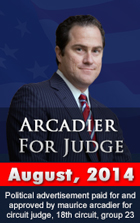A brief legal analysis from a motion opposing bifurcation of a case

1. The Florida Standard Jury Instructions in Civil Cases provide for bifurcation of trials only on the issue of punitive damages. It is clear that these instructions permit bifurcation only in personal injury cases. There does not appear to be any Florida state court decisions which support Defendant’s request to bifurcate all damages from liability in an age discrimination case.
2. In those cases where bifurcation is appropriate, the Florida Standard Jury Instructions require the Court to complete the trial on liability as well as actual and compensatory damages before trying punitive damages: “If you find for and against defendant, you should consider whether, in addition to compensatory damages, punitive damages are warranted in the circumstances of this case as punishment and as a deterrent to others.” See Florida Standard Jury Instruction PD 1 (2001). There is no procedure for bifurcating the issues of actual damages and compensatory damages such as emotional distress and mental anguish.
3. The Florida Supreme Court case cited by Defendant in its October 15, 2004, Motion provides guidance on the issue of bifurcation:
At the first stage of a trial…the jury should hear evidence regarding liability for actual damages, the amount of actual damages, and liability for punitive damages, and should make determinations on those issues. If, at the first stage, the jury determines that punitive damages are warranted, the same jury should then hear evidence relevant to the amount of punitive damages and should determine the amount for which the defendant is liable. W.R. Grace & Co. v. Waters, 638 So. 2d 502, 506 (Fla. 1994).
4. In Grace, the Court allowed for bifurcation of punitive damages because the defendant had a history of unlawful conduct and prior punitive damages judgments. Grace established the protocol described above to protect defendants “in mass tort litigation who are forced to litigate the issue of liability and damages in the same proceeding.” Grace, 638 So. 2d at 506. That is not the case here. The Defendant in this case does not fall into the class of defendants that the Supreme Court intended to protect in Grace.
5. The Defendant bears the burden of showing prejudice supporting its request for bifurcation. The Defendant in this case has failed to proffer facts showing that it will be prejudiced if the jury is permitted to hear evidence of punitive damages at the first stage of trial, much less evidence of actual and compensatory damages.
6. On the issue of evidence regarding actual and compensatory damages, in St. Paul Mercury Insurance Co. v. Coucher, 837 So. 2d 483 (5th DCA 2002), the Fifth District Court of Appeals upheld the trial court’s decision to follow the protocol established in Grace. In upholding the trial court’s decision not to bifurcate the issue of compensatory damages, the Court in Coucher wrote, “[w]e cannot conclude that a procedure prescribed by the supreme court results in excessive and unfair compensatory damages verdicts.” Coucher, 837 So. 2d at 488.
7. There are practical reasons against bifurcating this trial. Bifurcating the trial on liability and compensatory and punitive damages is time-consuming and not in the interest of judicial economy. Doing so will require the Plaintiff to take the stand twice and be cross-examined twice--first, to testify about the Defendant’s discriminatory actions and, second, to testify about the impact that the Defendant’s actions have had on her emotionally, physically and financially. This is a lot to ask of one witness. Furthermore, bifurcating the trial asks a lot of the jury as it will be required to engage in multiple deliberations.
Attorney: Maurice Arcadier
Status: Analyzed





